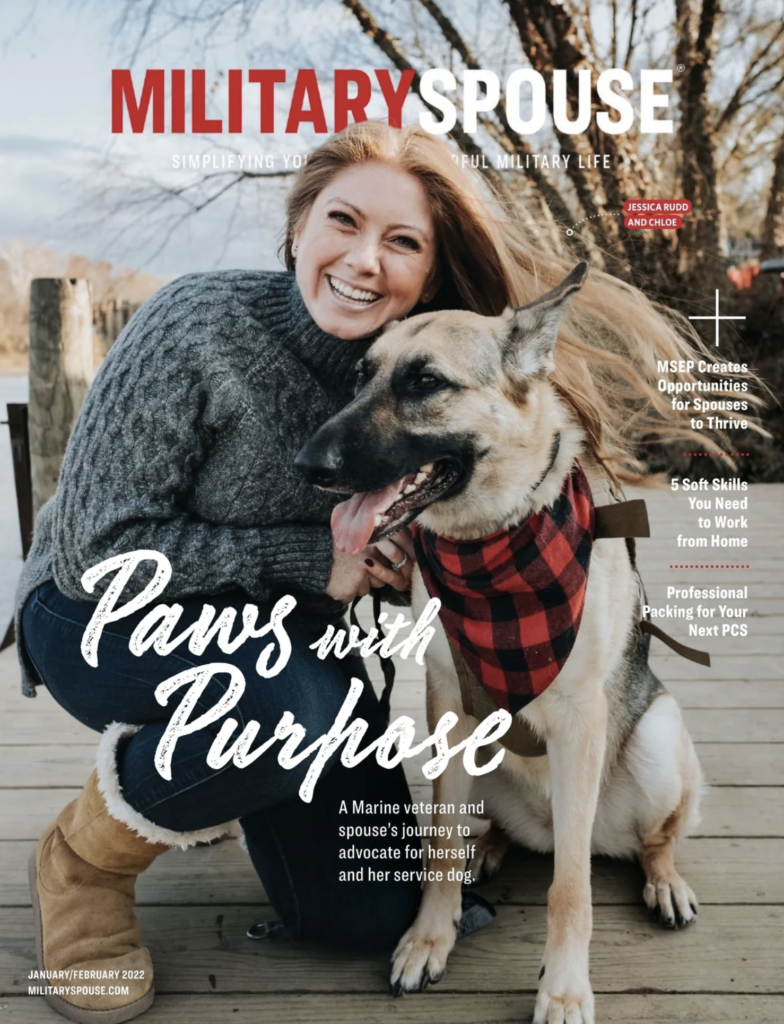As both a Marine Corps veteran and a military spouse, Jessica Rudd empathizes with the two passionate communities, building bridges of understanding between them.
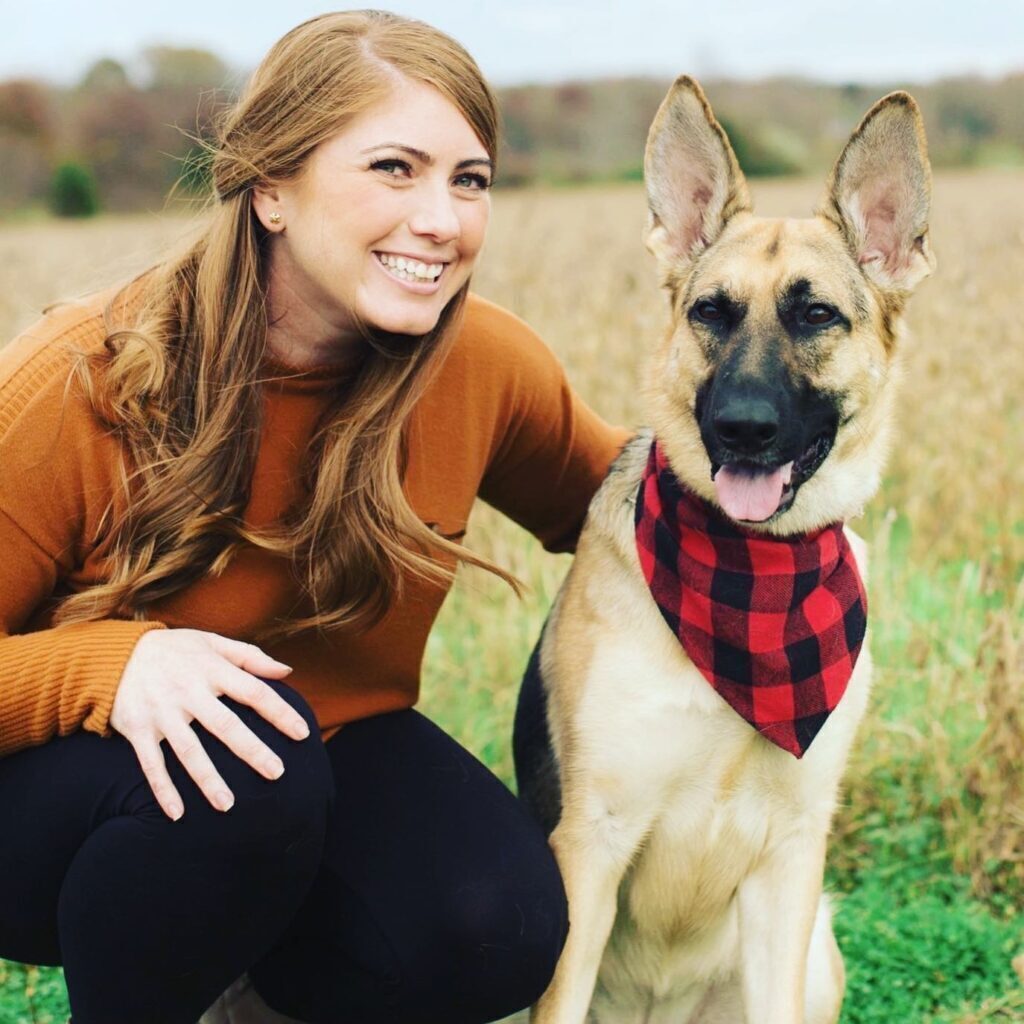
Named the 2017 Armed Forces Insurance Marine Corps Spouse of the Year, Rudd has a new mission: service dog advocacy. Rudd’s recently trained service dog, Chloe, helps her navigate challenges associated with PTSD and anxiety.
As the pair became fully integrated, Rudd gained an intimate understanding of the critical ways service animals impact their families, as well as the challenges many face when integrating into civilian and military life.
Filling a Void
In 2008, Rudd was deployed to Ramadi, Iraq. As a Lioness, Rudd and her team inspected female Iraqi citizens at various checkpoints.
“The point of those entry points is to weed out contraband and any kind of threat as they’re coming into a more condensed, populated area,” Rudd explained.
The Ramadi region was unsafe, Rudd said, and the Lionesses lost a member to a suicide bomber.
“We’re in River City, losing service members every day,” she reflected, using Marine jargon to refer to communications blackouts.
Rudd separated from the Marines in 2010, but immediately “switched hats” to military spouse life, she said. She married her husband in 2006.
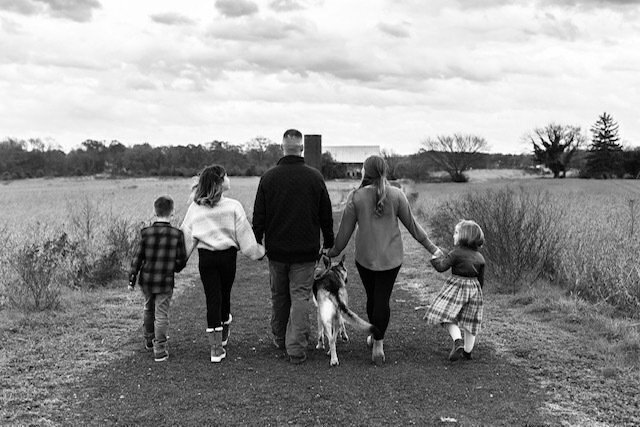
She recalled feeling the pressures to be flexible and resilient as a military spouse, while wrestling with PTSD, anxiety and depression from her time in the service.
“I really struggled with understanding where that threshold was,” Rudd said. “There was this void over these years where something was missing.”
Regular mental health sessions and a supportive friend led her to Semper K9, an organization that trains service dogs for psychiatric alert and mobility needs for veterans. Semper K9 accepted Rudd and her then-puppy, Chloe, into their maintenance program.
Amanda Baity, Semper K9’s director of operations, said veterans each need something different from a service animal. While Semper K9 trains all dogs for certain tasks, training is eventually tailored for the whole family.
“We tweak that training toward the end of the program to find out what we can get this dog to do to help this family meet their goal,” she said.
This could be anything from going to a child’s sporting event to visiting a large theme park.
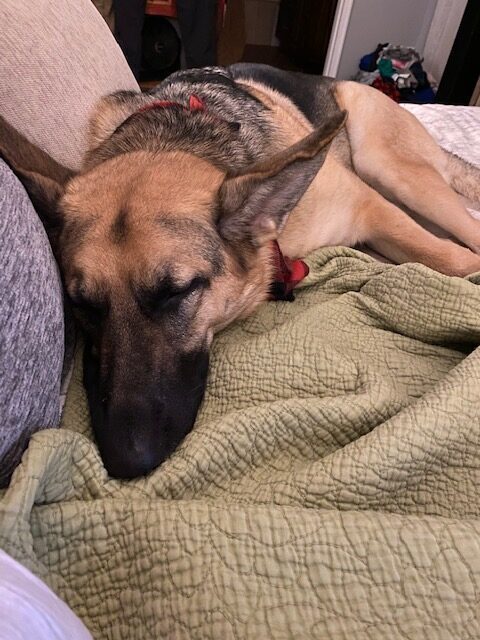
Rudd noted that training extends beyond graduation.
“It’s a continuous relationship and what you invest into is what you’re going to get out of it,” Rudd said, explaining that nurturing the relationship is essential because the service animal is medical equipment.
Chloe is now a full public access service animal. She runs with Rudd and helps her navigate public spaces.
Advocacy and Integration
Service animals like Chloe are protected under the Americans with Disabilities Act (ADA) and have full public access to stores, restaurants, and other facilities. However, as Rudd integrated into civilian and military life, she noticed gaps in understanding.
For example, Rudd recalled visiting a restaurant in Richmond, Va., where the wait staff wouldn’t seat her family and Chloe inside. They asked them to sit outside. It was January.
“A year ago, I wouldn’t have known how to deflect that, but now I know how to advocate for myself,” she recalled.
She explained to the staff what rights protected her and Chloe, but regretted that these barriers still present themselves.
Rudd experienced similar challenges as she integrated Chloe into military life.
When Rudd’s husband received orders to Japan last year, she found herself in a tangly process, trying to PCS overseas with a service animal.
Because the Department of Defense (DoD) and Veterans Affairs (VA) were not involved in acquiring or training Chloe, the system was not set up to accommodate that dynamic.
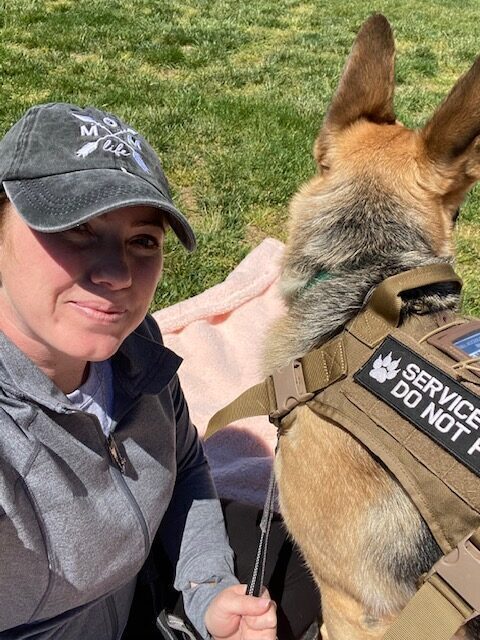
“The DoD is extremely removed from the needs of a service animal and having them on base. “We really struggled,” she said, describing a five-month long process in which EFMP and overseas screening grappled with accommodating a service animal overseas.
To be fair, PCSing overseas with a service animal is a unique situation where you might expect some snags, Rudd said. However, when she realized that offices could make decisions without fully understanding her needs and rights, Rudd learned an important lesson: “Be an advocate for yourself,” she said. “No one knows your situation like you do.”
After pooling many resources and rallying new actors to the advocacy table, Rudd is hopeful that progress will be made. In the meantime, Rudd is geo-baching in Virginia, where she can continue training Chloe and working as a consultant for Deloitte in Military Community and Family Policy.
Pawprints of Progress
Beyond her own experience, Rudd is pleased to see bipartisan action being taken to increase veterans’ access to service animals nationwide.
In August 2021, the PAWS Act was passed, which directs the VA to grant funds to private organizations that give service animals to veterans with PTSD. Costs associated with training service animals average $25,000, so VA support will offset a huge financial burden.
Baity said the law is a key step in reaffirming the enormous impact service animals have on veterans and their families. “Just having the VA recognize that psychiatric service dogs are a viable treatment option for veterans with PTSD and other mental health illnesses is a huge win.”
Service Dogs: An Essential Need
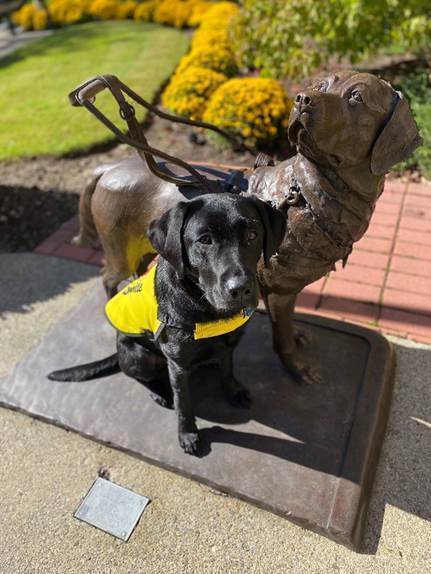
Jessica Rudd is proud to celebrate Deloitte’s Puppy with a Purpose program, which helps veterans and first responders receive service animals.
Deborah Golden, Deloitte’s U.S. Cyber and Strategic Risk leader, is raising Deloitte-sponsored service dog, Benny.
Golden, who has trained seven service dogs, shares valuable insight. “Having a service dog is life-changing for those who have one, and it’s something we need to keep in mind as we see individuals out in the world with a service, or guide, dog. It’s important for each of us, individuals, business owners, and beyond, to remember that service dogs are not pets, they are an extension of their handler helping to perform essential actions that many individuals may otherwise take for granted. I hope everyone shares more empathy, compassion, and change that makes having a service dog second nature as these trustworthy companions are truly a lifeline to their handlers.”
The service dog that Deloitte is sponsoring, Benny, is also included in the folder (Black Lab puppy).



